The Slavic Department offers a range of courses in Polish, Russian, Ukrainian and English. Please take a look at our upcoming course offerings along with a list of other recent and future courses. To sign up for our courses, go to the Course Catalog, and search for Russian, Polish, or Ukrainian.
Jump to current courses in Polish, Russian, Ukrainian, Literature & Culture
Upcoming Slavic Department Courses
(Spring 2026)
Literature & Culture
Every semester we offer a selection of courses on the literature and culture of the region taught in both Russian and English. Most of our literature & culture courses meet the HALC or Diversity Global core requirements.
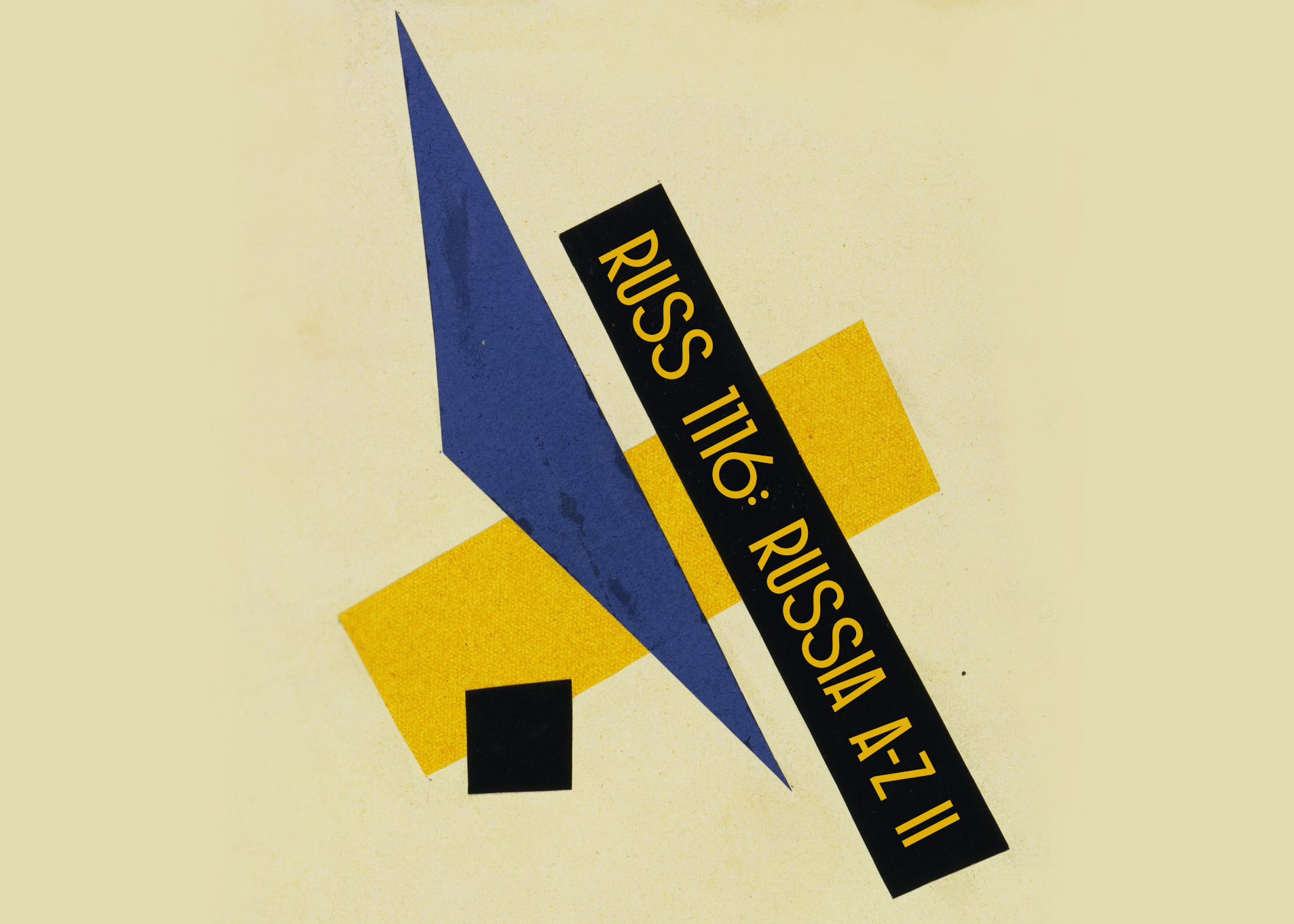
RUSS 1116: Russia A-Z II
Profs. Irina Denischenko, Milla Fedorova, Bradley Gorski, George Mihaychuk & Olga Meerson
Thursday 2:00–2:50 PM
Course Taught in English
This one-credit course surveys major topics in Russian culture from its beginnings to the present. It acquaints students with various issues and fields of inquiry in Russian language, literature, and culture and provides background for further study. It is an introductory course for interested students with little or no background in these subject areas. The course will be team-taught by members of the Department of Slavic Languages and will be primarily in lecture format. In the final three classes of the semester, a professor will be reporting on his or her individual research. All lectures and readings are in English. (No prerequisites. Students need not have taken Russia A to Z I.) (1 credit)
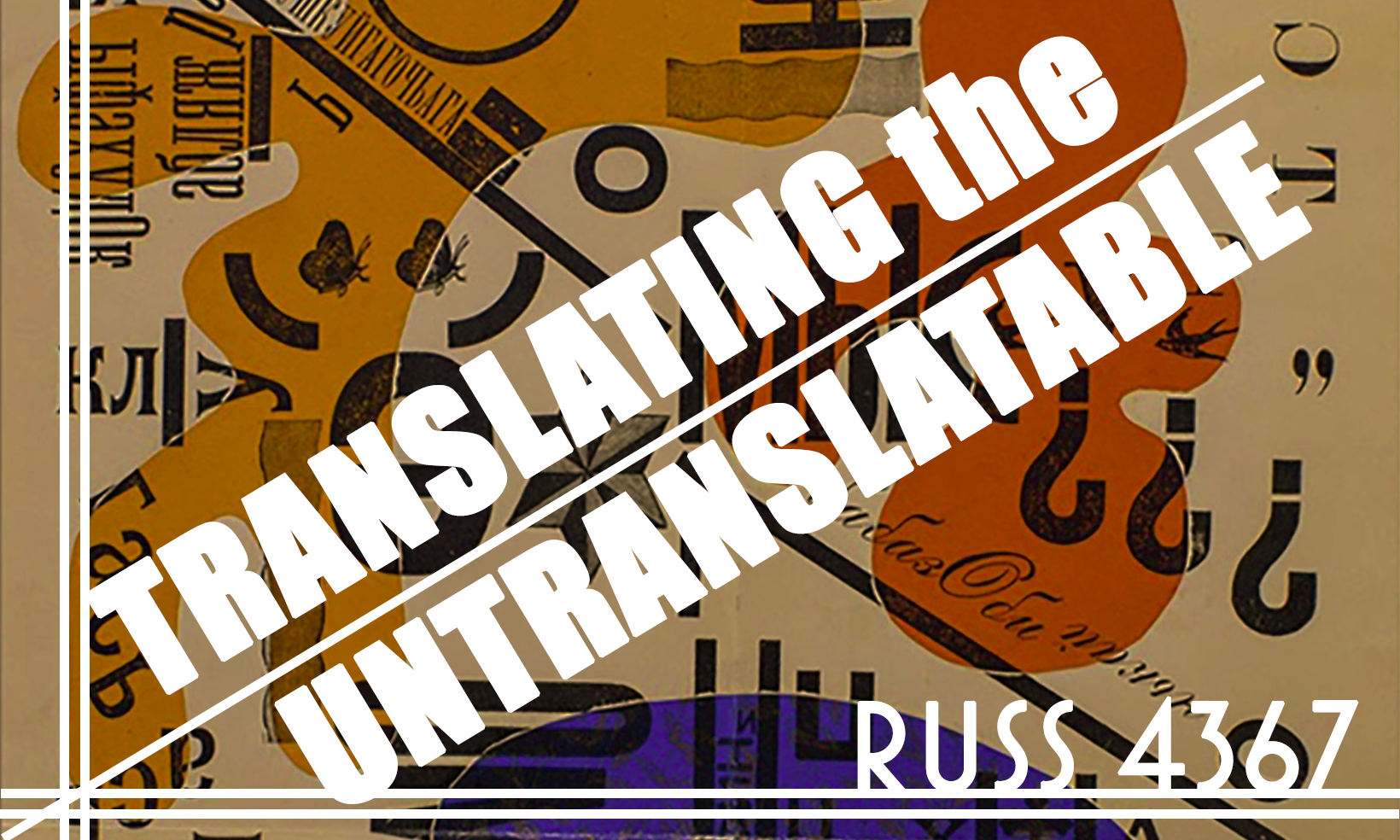
RUSS 4367 : Translating the Untranslatable
Prof. Olga Meerson
MW 11:00 AM–12:15 PM
Course Taught in Russian
This course addresses culture-specific aspects in translation—idioms, allusions, associative layers, syntactic structures and semantic emphasis. Students work on an array of texts that are considered to be “untranslatable.” We try to define what is untranslatable about them. Students learn ways to compensate for the untranslatable and to switch from one cultural code to the other, from the original language to the target one. The course requires in-class translation and a final project presented to the whole class. Discussion primarily in Russian.
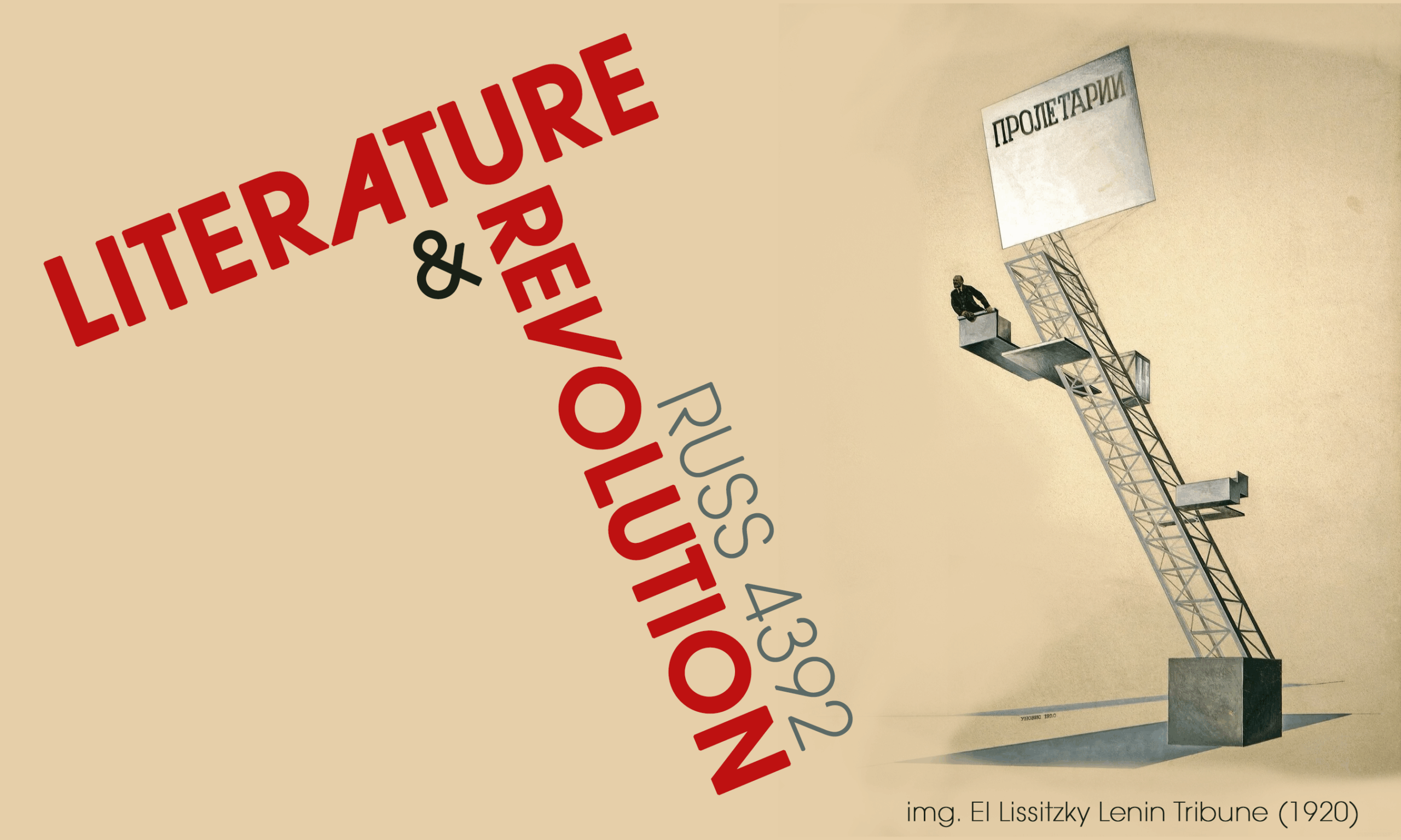
RUSS 4392 : Literature and Revolution
Prof. Bradley Gorski
TR 11:00 AM–12:15 PM
Course Taught in English
The 20th century brought violent upheavals to Russia and East Europe in bothculture and politics. This course covers the broad sweep of 20th-century Russian culture: great works of prose, poetry and other arts that bore witness to seismic changes, starting before the Bolshevik Revolution and continuing up to the post-Soviet era. We interrogate the relationship between political and cultural revolution, asking whether revolutionary literature can truly remake human nature, whether literary resistance can bring down a hated regime, and what lessons can be drawn from this volatile history that might be applied to our increasingly unstable world today. (3 Credits; HALC)

RUSS 4383 / ARTH 3840: Radical Art: Russia/East Europe
Prof. Irina Denischenko
TR 12:30–1:45 PM
Course Taught in English
This course investigates experimental art and literature of Russia and Eastern Europe in the first decades of the 20th century in a comparative context. Our aim is to examine diverse radical groups that identified themselves with “the avant-garde,” to consider their place in society and their relationship to politics, and to reflect on the position of experimental artists from this region within broader European trends. We ask: what distinguishes the avant-garde from other modernist trends? Can we speak of a unified international movement known as “the avant-garde,” or are there many avant-gardes? Where does the avant-garde stand in relation to socialist revolution and leftist politics? We interrogate the avant-garde’s relationship to the past, history, and tradition, and examine the techniques, media, and genres that were pervasive throughout its different factions. For the final students have the option to pursue a creative project that engages avant-garde techniques and strategies studied in the course. (3 credits; HALC)
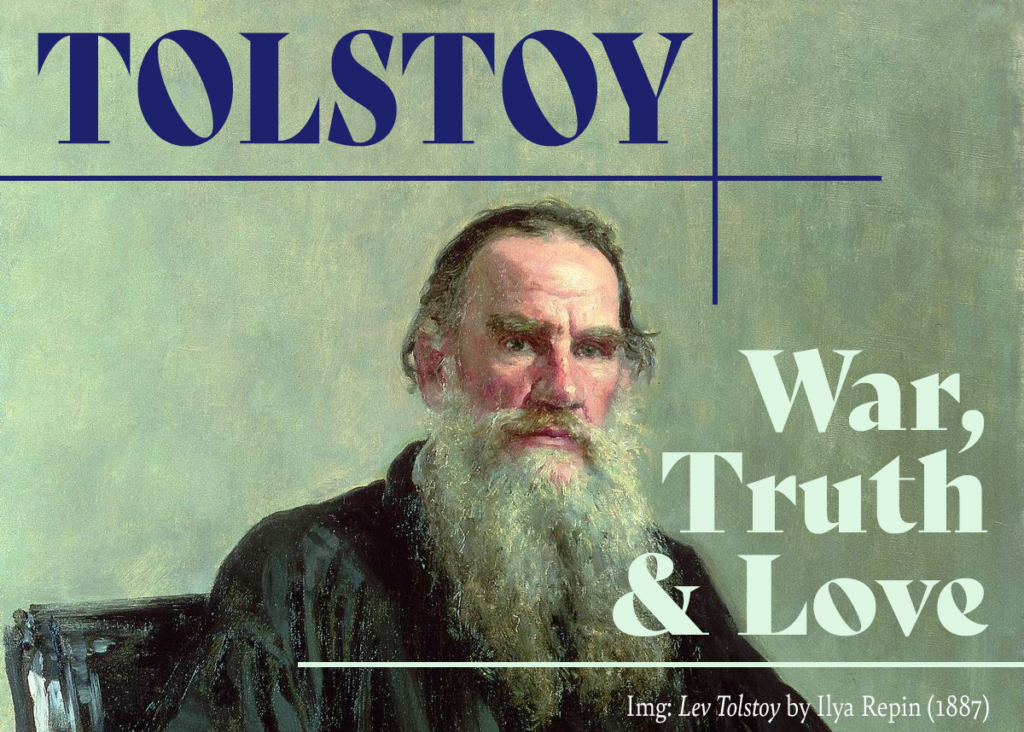
RUSS 4441: Tolstoy: War, Truth & Love
Prof. George Mihaychuk
MW 5:00–6:15 PM
Course Taught in English
Tolstoy was relentless in pursuing the truth and raising crucial questions about life: how can one be an authentic self? How can one live a meaningful life? How should I/ an individual relate to others/ community? What is the purpose of art? What is the Good? As one of the great Realist writers of the 19thc, he created memorable characters that confront such questions as they face daunting moments in their lives. In this course we will consider the intricacies of his characters and literary works, and how one can reconcile his championing clarity and simplicity with the complexity of his literary texts and his views on life. We will examine these issues in several works: an early story from the Sevastopol Tales, his great novel War and Peace, “The Death of Ivan Il’ich,” his play The Power of Darkness, “Hadji Murat,” and his booklet What is Art? (3 credits; HALC)
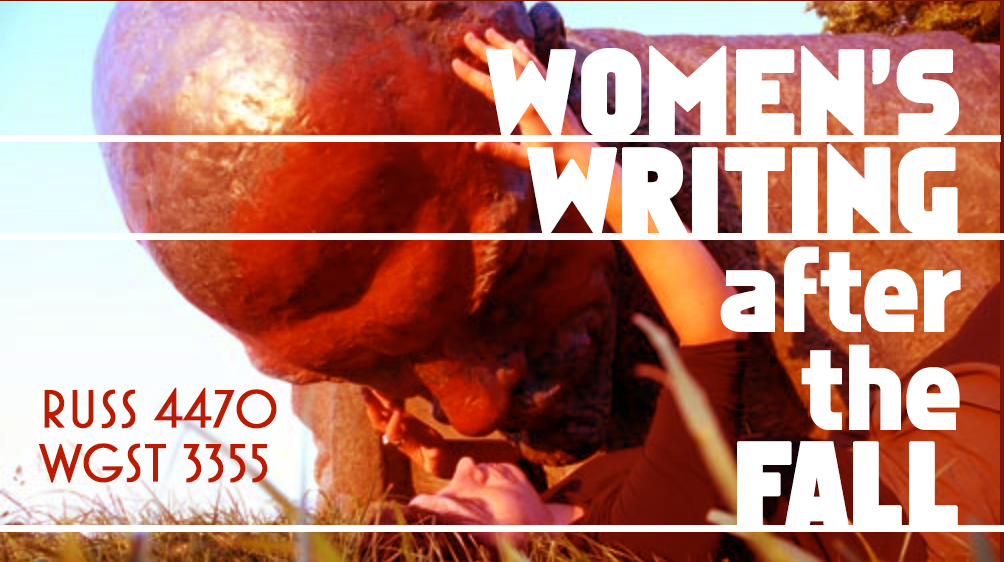
RUSS 4470 / WGST 3355: Women’s Writing After the Fall
Prof. Irina Denischenko
TR 3:30–4:45 PM
Course Taught in English
This course explores contemporary women’s writing in Eastern Europe after the fall of Communism, with particular attention to reception of Western feminism and critique of capitalist culture. Through short stories, poetry, novels, and essays from across East and Central Europe from the time of transition, students engage with the complex attitudes and feelings that accompanied the political, economic and social changes in the region. Far from unambiguously embracing democracy and free markets, many writers from the region express deep anxiety about the loss of a culturally distinct past and a shared multi-ethnic and multi-national culture, alongside more positive feelings about new freedoms of movement and expression. Includes four Nobel Prize-winning authors and creative assignments. (3 credits; HALC)
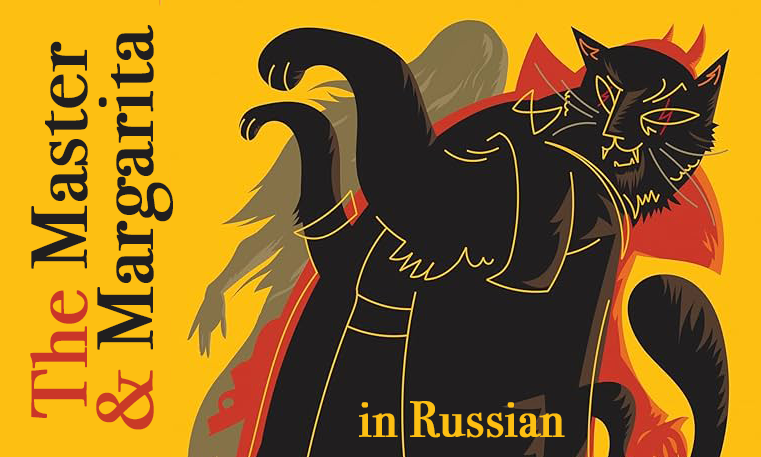
RUSS 4492: The Master & Margarita
Prof. Milla Fedorova
MW 3:30–4:45 PM
Course Taught in Russian
The Master and Margarita is widely considered the major Russian novel of the twentieth century. It is complex and intriguing: Bulgakov’s version of the New Testament is also a picaresque adventure of the Devil and his whimsical gang in the Soviet Moscow of the thirties, a beautiful romance, and a story about the fate of a writer in a bureaucratic totalitarian society. What is a greater evil: the romantic Devil or triumphant mediocrity – a member of the Writers’ Union? – asks Bulgakov. In this course, we will close-read the novel in Russian, analyze its various sources: literary, philosophical, musical and theatrical, and will attempt to solve some of its numerous mysteries. The classes are conducted mainly in Russian, in the form of discussions. (3 credits.)
Polish
- PLSH 1002: Beginning Polish II (3 credits)
- MWF 12:00–12:50 PM – Iwona Sadowska
- PLSH 1502: Intermediate Polish II (3 credits)
- MWF 9:00–9:50 AM – Iwona Sadowska
Russian
- RUSS 1011: First-Level Russian I (6 credits)
- MTWRF 1:00 PM + F 2:00 PM – Jill Neuendorf & Anna Pechnikova
- MTWRF 1:00 PM + F 2:00 PM – Jill Neuendorf & Anna Pechnikova
- RUSS 1012: First-Level Russian II (6 credits)
- MTWRF 11:00 AM + F 12:00 PM – Jill Neuendorf & Anna Pechnikova
- MTWRF 3:00 PM + F 2:00 PM – George Mihaychuk & Svetlana Moser
- RUSS 1511: Second-Level Russian I (6 credits)
- MTWRF 9:00 AM + F 10:00 AM – Jill Neuendorf & Anna Pechnikova
- MTWRF 9:00 AM + F 10:00 AM – Jill Neuendorf & Anna Pechnikova
- RUSS 1512: Second-Level Russian II (6 credits)
- MTWRF 12:00 PM + F 1:00 PM – Jill Neuendorf & Anna Pechnikova
- MTWRF 2:00 PM + F 3:00 PM – Iwona Sadowska & Svetlana Moser
- RUSS 3001: Third-Level Russian I (3 credits)
- MW 2:00–3:15 PM – Olga Meerson
- MW 2:00–3:15 PM – Olga Meerson
- RUSS 3003: Russia(n) in Context (3 credits)
- TR 3:30–4:45 PM – Elena Boudovskaia
(A continuation of RUSS-3002). This course develops students’ oral and reading proficiency and inter-cultural competence. It reviews grammar covered in the first two levels. A variety of materials, including selections from Russian literature and contemporary press, as well as films and TV broadcasts will be employed to introduce topics of discussion and enhance the students’ ability to converse on daily topics and debate cultural, political and social issues in Russian life today.
- TR 3:30–4:45 PM – Elena Boudovskaia
- RUSS 4006: Russian Through Culture (3 credits)
- TR 9:30–10:45 AM – Bradley Gorski
This course develops students’ Russian language skills by reading, watching, analyzing, and discussing authentic cultural documents. We will read great (short) works of literature in the original Russian, watch classic Russian and Soviet films, and analyze contemporary culture and historical movements. Students will not only sharpen their reading, writing, listening, and speaking skills in Russian, but they will also engage with a broad survey of important Russian culture. They will develop the intercultural sensitivity and understanding they need for careers or further study in Russia or the Russophone world.
- TR 9:30–10:45 AM – Bradley Gorski
- RUSS 4194: Sixth-Level Russian (3 credits)
- TR 5:00–6:15 PM – Elena Boudovskaia
Designed for graduate students in CERES and MSFS who will be using Russian in their professional lives, this course aims to enhance the participants’ command of the language in both the oral and written forms. The course will focus on the preparation, delivery and discussion of oral presentations and written essays on topics related to the students’ professional interests. Topics will range from international relations, politics and economics to Russian literature and popular culture.
- TR 5:00–6:15 PM – Elena Boudovskaia
Ukrainian
- UKRN 1102: Beginning Ukrainian II (3 credits)
- TRF 11:00–11:50 AM – Elena Boudovskaia
- UKRN 2002/3308: Intermediate Ukrainian II (3 credits)
- TR 12:30–1:45 PM – Elena Boudovskaia
Past and Future Slavic Department Courses
The Slavic Department offers a wide range of courses on an occasional and rotating basis. Browse the following categories to get a sense of what courses we have offered in the past and what we will offer again sometime soon.